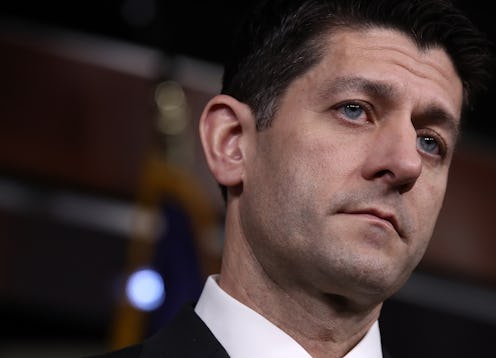News
House GOP Releases Obamacare Repeal Bill

On Monday afternoon, House Republicans released their Obamacare repeal bill online. According to a two-page factsheet provided by the House GOP, this proposal would eliminate the law's individual mandate, as well as its employer mandate, and "dismantle" the law's taxes. In addition, it would sharply reduce Medicaid coverage and completely eliminate the subsidies offered to low-income Americans for purchasing health care, according to an analysis by Axios.
The bills would also preserve Obamacare's prohibition on denying insurance to people with pre-existing conditions, as well as the components allowing Americans to stay on their parents' health care plans until the age of 26. Although it eliminates the tax penalty for Americans who don't have health insurance, it institutes a new penalty for those who have a lapse in coverage.
Republicans have released no estimates of how much the new legislation would cost, nor how many people would lose their health insurance if it's passed.
The GOP's proposal, takes the form of two separate bills — one from the Energy and Commerce Committee and one from the Ways and Means Committee. Although the GOP's summary factsheet doesn't say this, Axios reports that the proposals would freeze new enrollment in Obamacare's Medicaid expansion, and end the expansion entirely by 2020. In addition, it would place caps on the amount of financial aid any individual Medicaid recipient can receive for purchasing health insurance.
The Republican plan would eliminate two of the law's biggest provisions, both of which expand health care access for low-income Americans: the subsidies, including the premium tax credit, and the Medicaid expansion. In place of the subsidies, it will offer a refundable tax credit; however, according to an analysis by The Hill, this would effectively reduce financial assistance to older and low-income Americans while increasing it for for wealthier and younger Americans.
Although this bill is endorsed by Republican leadership, it should not be considered a "final draft." In order for it to become law, several things will need to happen, none of which are a given. First, the House will have to pass it. Second, the Senate will have to pass an identical bill; if it fails to do so, both chambers will need to craft a compromise bill that can pass both chambers. Finally, President Trump will need to sign whatever legislation passes both houses.
Maybe all of those things will happen. But maybe they won't. The same day the House GOP released this draft, four Senate Republicans released a statement implying (though not stating outright) that they will oppose any significant reductions to Medicaid access — reductions the current bill contains. In the Senate, four Republican defections would be enough to torpedo the bill, so Republican leadership in the House will need to find a way to accommodate these if they want to scrap Obamacare.
In short, the Obamacare repeal effort is still in its early stages, and there are still many, many, many more negotiations that need to be held before the plan comes anywhere close to Trump's desk.